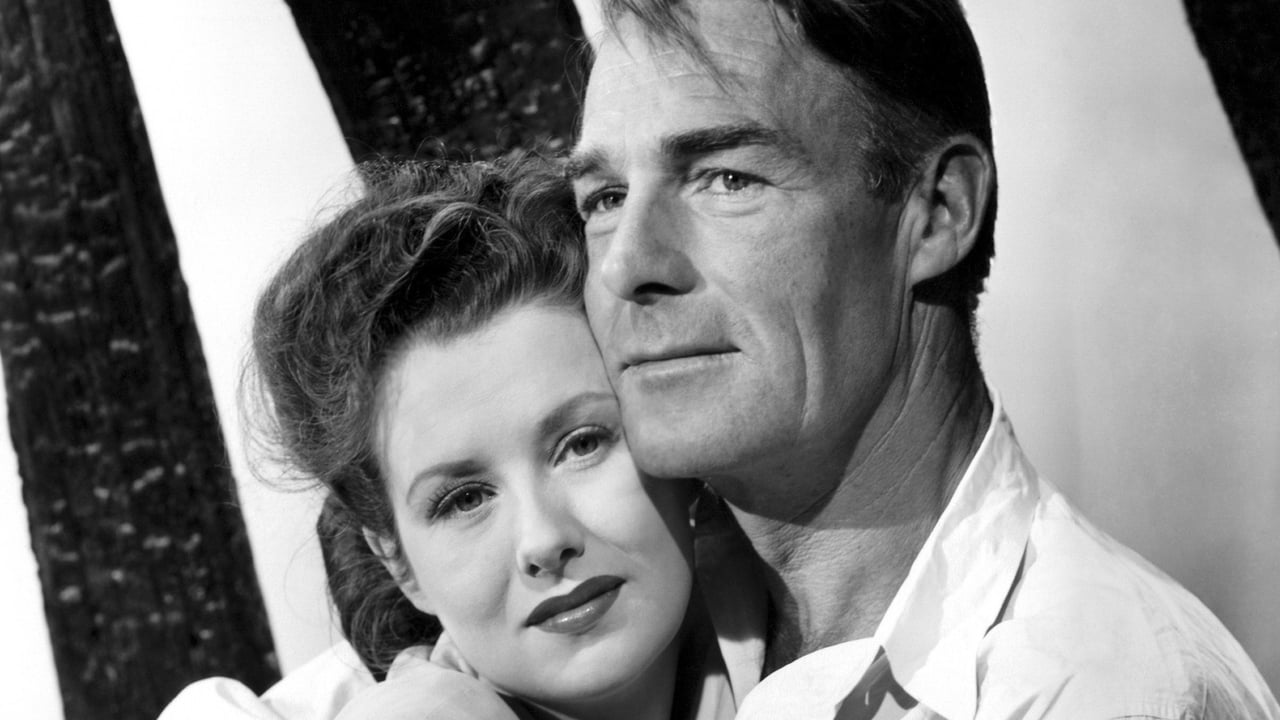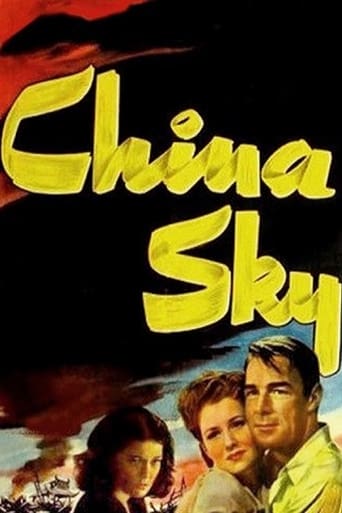weezeralfalfa
Filmed as WWII in the Pacific was coming to a conclusion, this adaptation of the Pearl Buck novel of the same name deals with the Japanese invasion of China some years before WWII began. The reviews here thus far have been pretty negative, sometimes scathing. My review will be more positive.I haven't read the novel. However, I did consult a summary. The film follows the novel in most respects , until the last part, when the Japanese paratrooper invasion is added, and the ending is changed to more conform to the expectations of a morality play. Buck's traitorous Chinese Dr. Chung is transformed into the traitorous Korean-Japanese Dr. Kim, apparently for political reasons. His equally traitorous brother is deleted, as is Ya-ching: a nurse having an affair with Dr. Chung, while he is courting the more desirable intern Siu-mei, as dramatized. Siu-mei's father, who doesn't like Dr. Chung, and approves her infatuation with guerrilla leader Chen-ta, is also deleted. The Englishman in a nearby town, who develops an affair with Louise: the bored socialite wife of missionary Dr. Thompson, is also deleted. Thus, the several romantic triangles in the film are actually more complicated in the novel, with deleted characters also involved.The screenplay takes place exclusively in and around a fictional Chinese village, in a region with many caves, which come in handy as safe havens when bombs are dropped on the village(a frequent occurrence). They also serve as hideouts of the local guerrilla forces, and for making and storing their munitions and other necessities.Dr. Gray Thompson(Scott), from a wealthy family, chose to spearhead the building of a mission hospital in this village, which the Japanese consider rather important, but their ground troops haven't yet reached it. However, he's back in the US, securing additional funding and equipment. Meanwhile, American doctor Sara Durand is in charge of the hospital, with supposedly full Korean Dr. Kim in charge of the men's section. Kim is disgruntled that he is under the authority of a woman: something unheard of in Korea. Sara clearly is upset when she receives a telegram that Gray will arrive, with his(new ) wife, Louise . It doesn't take Louise long to imagine that Sara was hoping to eventually become Gray's wife, although Gray had shown no signs of thinking of her in a romantic way. Louise becomes increasingly paranoid about a denied romantic relationship between the 2, as they spend most of their waking hours in the hospital. Also, she much fears (with good reason) the frequent bombings, and feels no connection with the Chinese or her surroundings. Gray tries to reassure her of his love, and balks at her demand to quit this life and return to the US.Meanwhile, Dr. Kim feels alienated by the evidence that his girlfriend , intern Siu-mei, actually more likes guerilla chief Chen-ta. Thus, he finally gives in to the requests of captured hospitalized Japanese Colonel Yasuda that he make him seem more sick than he is, to delay a public trial as a war criminal, and to arrange for a telegram to be sent to the Japanese military. Louise unknowingly becomes involved in this plot when Kim claims he can arrange for a plane to take her and Gray safely out of China. Kim thinks Yasuda's idea is that he will also be on this plane., But actually, the coded telegram that Yasuda has written asks for a paratrooper drop. After house boy 'Little Goat' reveals what he has seen, Gray gets very suspicious of some dealing between Kim and Yasuda, and confronts them. Yasuda pulls out a stolen pistol and shoots at them, killing Kim, escaping to meet the paratroopers. Gray quickly organizes a village defense against the Japs, and Chen Ta rallies his cavalry to ride to the village. A battle ensures, with the Japanese presumably eventually being vanquished, although this is not shown. During the battle, Louise, in the hospital, becomes hysterical, partly from her indirect role in summoning the paratroopers. She rushes outside, into the line of fire, presumably trying to reach Gray, and is shot dead by the Japs, thus ending Gray's romantic dilemma. Siu-Mei's romantic dilemma is also solved by Kim's death.(In the novel, Louise returns to the U.S. without Gray).Most reviewers here decry the casting of Mexican Anthony Quinn as Chen-Ta, as an intolerable phoniness. Well, in his career, Quinn was cast as many types of ethnics, including a Berber chieftain, and even the Prophet Muhammad. But, he always looked basically Mexican. At least, he was made up to look more oriental than was Peter Lorre, in "They Met in Bombay", and later in "Around the World in 80 Days". Caucasian Carol Thurston, who also commonly was cast as various ethnics, was acceptably made up to look Chinese. Young Ducky Louie, as houseboy 'Little Goat', provided some reprieve from the tense drama, with his charm and rapport with Scott. I thought Scott, Ruth Warwick, as Sarah, and Ellen Drew, as Louise, played their roles well. Richard Loo overdoes his characterization of a despicable Japanese, but consider the mindset of most Americans and Chinese at this time. Some complain there's not enough action. How many times do you want the Japs to bomb his village? What about the battle near the end, not to mention the frequent battles between the main characters before. With a little more care in the screenplay and production, this could have been a first rate drama, with an exotic setting, to add interest.
Clothes-Off
Randolph Scott gets top billing, but ultimately this is Ruth Warrick's picture. She's a doctor holding together a makeshift hospital in China while its founder (Scott) is on his way back with much needed supplies--and a new wife, to her thinly-veiled disappointment. Having seen Warrick in a few other 1940s films, I can understand why the doc failed to notice her: despite her attractiveness, she never really exuded any sex appeal. But her character is very likable, while the new wife's shallowness becomes apparent within minutes of her entrance. And that's the problem with this picture--too easy. In fact, all it does is lower the audience's opinion of the foolish doctor for not seeing what's painfully apparent even to the other character's who don't speak the language. There's a similar subplot involving another doctor and a nurse, that's equally obvious. A wounded Japanese villain provides more action for the story, whose loose ends get tied up all too neatly and quickly. Either Pearl S. Buck's original novel just wasn't one of her better ones, or this movie doesn't do it justice. Nevertheless, it probably made for a decent lead-in on a double-feature back in the day.
Ishallwearpurple
----to fight over Randolph Scott in WWII China. Anthony Quinn, in an early role, plays the leader of the mountain fighters after the Japanese have taken over much of the country. Scott and Warrick are doctors in hospital at the village that supports the fighters. At the beginning of the film, Scott has gone back to America to raise funds for supplies and while there, meets and marries a spoiled beauty (Drew) and brings her back to the daily air raids and death at the village.
Warrick, who has always loved her fellow doctor, tries to make the best of the situation, but as the weeks go by it becomes clear that Drew only came back with Scott to make him see that he should leave the war zone and come back with her to America. The verbal cat fight scenes between Warrick and Drew are the best part of the film. The people of the village being herded into the mountain caves during air raids; the fight near the end between the invaders and the mountain fighters and villagers, is handled very well.
Despite the "A" list performers, this was considered a "B" film for the lower half of a double bill in the war years. As a preteen who first saw this the year it came out, I remember the Sat. matinee kids cheering for the good guys and booing the baddies. Watch it for a look at the past. 7/10

